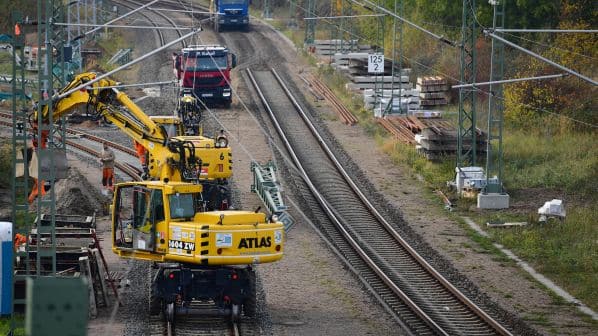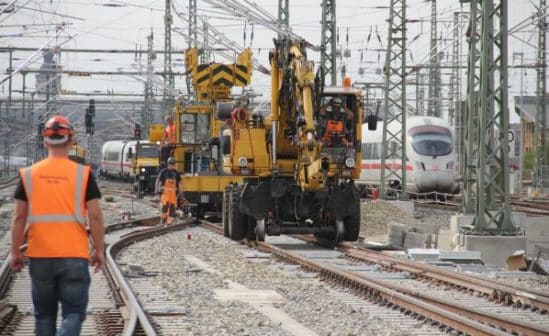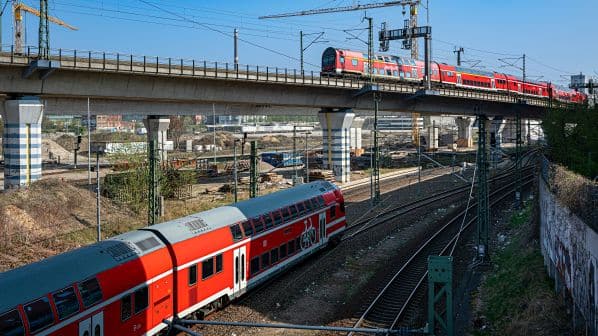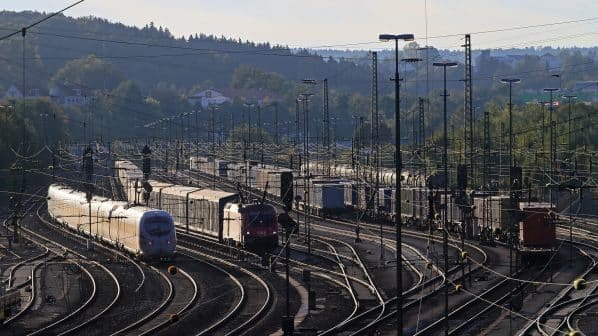THE Federal Ministry for Digital Affairs and Transport (BMDV) has announced that the German cabinet has allocated €12.5bn to rail from the Climate and Transformation Fund (KTF), giving priority to this climate-friendly mode of transport.
BMDV says that the KTF is intended to help meet the challenges of reducing emissions while keeping people and goods moving, and at the same time ensure that Germany remains competitive in the field of climate-neutral motive power technology and fuels.
The ministry says that rail has been neglected considerably in the past decades, leading to “an immense investment backlog” that will require additional funding of up to €45bn by 2027 to clear.
In the draft 2024 budget and financial planning for the period up to 2027, BMDV has already earmarked an additional €11.5bn for rail, funded by receipts from the CO2 surcharge on heavy goods vehicles.
The KTF will now provide an additional €12.5bn, with German Rail (DB) making its own contribution of €3bn financed by a loan which it will raise on the capital markets.
BMDV says it also considering whether additional funding to reduce the infrastructure investment backlog can be made available to DB via an increase in the company’s equity.
In 2019 the federal government adopted a policy of increasing DB’s equity by €1.12bn a year up to 2024 to fund “basic rail infrastructure and digitisation measures.”
The government will soon hold talks with the European Commission (EC) to determine if additional funding can be provided through further equity measures.
BMDV says it will do all that it can to continue the major increase in rail investment over the coming years, as demonstrated by the coalition government’s decision in March to make up to €45bn in additional funding available by 2027.
“We are investing more than ever before in the infrastructure and thus in the future viability of our country,” BMDV says.
“The challenges facing this federal government are great and the resources are limited. Against this background, we are deliberately prioritising the railways in order to finally advance and modernise this important mode of transport.”
According to federal transport minister, Dr Volker Wissing, this “massive” financial package would move rail to its rightful position at the centre of a modern and sustainable transport network.
“An efficient, reliable, modern, digitised rail network is a prerequisite for freight transport to be reliable and punctual, and for people to enjoy travelling by train,” he says.
“The Deutschlandticket also needs an efficient network in order to be able to deliver its full potential.
“In September we will invite the railway and construction industry to discuss together how we can use this record funding in the most efficient manner in order to quickly achieve noticeable improvements for passengers and freight customers.”
In response, Mofair, the association representing German private passenger operators, says that the announcement “raises more questions than it answers,” pointing to the remaining funding shortfall of €18bn.
“We are still a long way from the €45bn undisputedly required by 2027,” says Mofair managing director, Mr Matthias Stoffregen. “So how and where will the remaining funds come from?”
According to Stoffregen, “even more irritating” is the announcement that DB will make its own contribution of €3bn by raising a loan on the capital markets and increasing its debt burden.
“Has every debt ceiling of the DB Group, which could have accumulated debts of around €40bn by the end of 2023 anyway, been abolished in the meantime?" he asks.
Mofair says that appropriate funding is needed to tackle the infrastructure investment backlog and provide urgently-needed additional capacity, but that this programme must be carried out with full transparency.
“The fact that the financing is now being divided between so many pots and shadow budgets does not promise any transparency and also suggests that the real financial requirements are still not in everyone's minds, or at least not enforceable,” Mofair says.
“Using crutches such as additional debt for the DB Group does not bode well for the project. Honest and transparent financing via the regular federal budget would be more effective. The remaining financing gap of €18bn must be closed.”
Mofair also says that DB must ensure that the €3bn it raises on the capital markets is allocated “clearly and transparently” to rail infrastructure, and is not lost in the company’s total debt of more than €36bn.
It says that the funding provided by the additional increases in DB equity, as planned by BMDV, should only be made available to the future infrastructure manager. This funding should not distort competition in favour of DB’s operating businesses.
“The equity increases must not drive up track access charges, which are already the most expensive in Europe for long-distance traffic,” says Mofair, pointing out that the modal shift required to deliver climate change objective will only be possible if rail is competitive.
For details of rail infrastructure projects around the world, subscribe to IRJ Pro.




